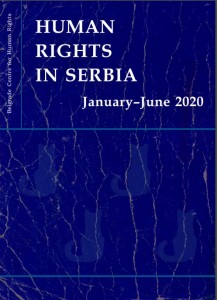 The Belgrade Centre for Human Rights (BCHR) today published its Report on the State of Human Rights in Serbia in the first half of 2020, focusing on respect for human rights during the state of emergency. The Report concludes that democracy in Serbia has continued deteriorating and lists grave violations of human rights, particularly as of 15 March 2020, when the state of emergency was imposed in response to the COVID-19 pandemic.
The Belgrade Centre for Human Rights (BCHR) today published its Report on the State of Human Rights in Serbia in the first half of 2020, focusing on respect for human rights during the state of emergency. The Report concludes that democracy in Serbia has continued deteriorating and lists grave violations of human rights, particularly as of 15 March 2020, when the state of emergency was imposed in response to the COVID-19 pandemic.
The Decision on the Proclamation of the State of Emergency and all the subsequent measures were adopted by the executive rather than the legislative authorities. Resort to this possibility, although provided for by the Constitution subsidiarily and in exceptional cases, was unjustified. Grave violations of constitutionally guaranteed human and minority rights, including disproportionate restrictions of the freedom of movement, occurred during the state of emergency; numerous examples and accounts of citizens who were beaten up, arrested and detained for violating self-isolation measures they had not been properly notified of were registered.
The Constitutional Court was apparently hibernating during the state of emergency. Sixty-seven days passed from the day the state of emergency was imposed until it rendered its first decision. It only reacted publicly to criticisms of its dormancy. By mid-May, it received a total of 51 initiatives challenging the constitutionality and legality of regulations enacted during the state of emergency: 10 questioned the constitutionality of the Decision on the Proclamation of the State of Emergency and 41 the constitutionality and legality of other regulations adopted since 15 March 2020.
The media situation continued deteriorating in the first half of the year. The number of attacks and pressures against journalists increased, as did the authorities’ rhetoric against impartial outlets. The Government Conclusion of 28 March allowing only the COVID Crisis Headquarters headed by the Prime Minister to release any pandemic-related information was tantamount to centralisation of information and censorship. Violations of media freedoms climaxed with the arrest of Nova portal’s reporter Ana Lalilć on 2 April for causing public anxiety by reporting on the problems in the Vojvodina Clinical Centre during the pandemic.
International institutions and organisations alerted to grave problems with respect to democracy, rule of law and reforms in Serbia in the first half of the year. In its Non-paper, the European Commission noted serious delays and the need to accelerate reforms in the key areas of judicial independence, the fight against corruption, media freedom, the domestic handling of war crimes and the fight against organised crime, specifying that the pandemic created additional challenges. In its Freedom in the World 2020 Report, Freedom House classified Serbia as a hybrid regime, citing data coinciding with BCHR’s annual human rights reports.
The judiciary, as a separate branch of government, did not fulfil the standards and expectations related to the improvement of its efficiency, fairness of access to justice and protection of civil rights. Introduction of “Skype” trials during the state of emergency, denying the defendants a public explanation of the decisions against them, and case law discrepancies resulting from the imposition of different penalties for the same offences committed during the state of emergency, further eroded legal insecurity and public trust in the judiciary.
The Protector of Citizens, the Commissioner for the Protection of Equality, the Commissioner for Information of Public Importance and Personal Data Protection and the Anti-Corruption Agency were not particularly active in the first half of the year either, especially during the state of emergency, when citizens needed and, indeed, expected greater protection. The parliament’s failure to promptly initiate the procedure to elect the new Equality Commissioner was particularly concerning: this institution has not been performing its duties conferred by law to protect the citizens from discrimination since May, when the prior Commissioner’s term in office expired.
The Report on Human Rights in Serbia in the January-June 2020 Period is available HERE.
This publication is the product of our team, comprising Lazar Stefanović, Snežana Lazarević, Vladica Ilić, Luka Mihajlović, Vesna Petrović, Dušan Pokuševski, Ivan Protić, Goran Sandić, Anja Stefanović, Milena Ančić, Bojan Stojanović, Aleksandar Marković, Ana Trifunović i Duška Tomanović.
The publication of this Report has been supported by the United Nations Human Rights Team in Serbia. The Report does not necessarily reflect the views of the United Nations.











